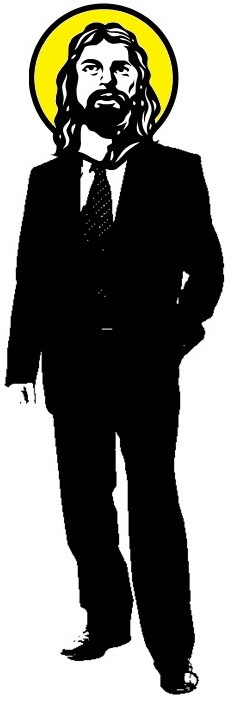 If Christ set up his ministry today, said Thomas Carlyle, people would not crucify him. “They would ask him to dinner, and hear what he had to say, and make fun of it.” Well, I think Carlyle was mostly right. Dinner, yes. Listening, yes. Making fun? Some of us might, but many others would be eager to take the Son of Man at his word. Christ would do just what he did before, assuming he ever existed: he would set up shop as the messiah of a New Religious Movement. This time, however, he’d get rich.
If Christ set up his ministry today, said Thomas Carlyle, people would not crucify him. “They would ask him to dinner, and hear what he had to say, and make fun of it.” Well, I think Carlyle was mostly right. Dinner, yes. Listening, yes. Making fun? Some of us might, but many others would be eager to take the Son of Man at his word. Christ would do just what he did before, assuming he ever existed: he would set up shop as the messiah of a New Religious Movement. This time, however, he’d get rich.
There are a number of self-styled Christs around at the moment, claiming to be the reincarnation of That Guy. Notice that we’re not talking about the classic Second Coming here, the one that involves trumpets and Armageddon and the Rapture, though some of the candidates do claim to be heralding the end of the world. Wikipedia’s (incomplete) roster lists twenty-two for the 20th century, and five so far for the 21st, including a few who bill themselves only as the Son of God and not Jesus specifically (implying that God got around a bit), plus Haile Selassie, who did not make the claim himself. The list does not include the dozens who claim general messiah status, but do not identify themselves as Jesus. Neither does it include sufferers from the wild and wonderful Jerusalem Syndrome, some of whom temporarily think they’re Jesus, but get over it. My provisional list for 1800-2014 stands at thirty-nine.
They’re a diverse lot, these Christs: American, British, Australian, Ethiopian, South Korean, French, Hungarian, Indonesian, Malaysian, Japanese, Puerto Rican, Brazilian, Persian, Russian, Chinese, Spanish, and South African. Black, white, Asian. Male and female. Mystics, murderers, ministers, an engineer, a geologist, an emperor, an ex-spy, and some guy who reads feet. I suspect they’re also diverse in their motivations and sanity level.
Which brings me to Lewis’s trilemma: Lord, Liar, or Lunatic? This was the argument used by C.S. Lewis to maintain that Christ could not possibly have been just a fantastic bloke with a great moral message:
I am trying here to prevent anyone saying the really foolish thing that people often say about Him: “I’m ready to accept Jesus as a great moral teacher, but I don’t accept His claim to be God.” … A man who was merely a man and said the sort of things Jesus said would not be a great moral teacher. He would either be a lunatic — on a level with the man who says he is a poached egg — or else he would be the Devil of Hell… We are faced, then, with a frightening alternative. This man we are talking about either was (and is) just what He said or else a lunatic, or something worse. Now it seems to me obvious that He was neither a lunatic nor a fiend: and consequently, however strange or terrifying or unlikely it may seem, I have to accept the view that He was and is God. (Mere Christianity, 1952:32)
Now, apart from Lewis’s stunning naivety about the formation of the historical record, his equally stunning leap of faith, and his fallacious omission of other possibilities, he has a good point: that, roughly speaking, people making claims of divinity are either deluded/nuts, or they’re not good people. In either case, it is not a wise idea to follow them. So what about the recent crop of Christs?
Option 1: Lord
There are over three dozen Christ-clones on the list, and at most only ONE of them at a time can be telling the truth. (None is far more likely.) The rest, according to Lewis’s limited set of options, must be either lunatics or liars.
Option 2: Lunatic
There is no doubt that some claimants are or were mentally ill. Maurice Clemmons, habitual criminal and cop-killer, was severely disturbed—likewise, Thomas Provenzano. Geologist and Christ-pretender Laszlo Toth, who ran amok with a geologist’s hammer on Michelangelo’s Pieta, ended up in a psych ward rather than a jail. Yang Xiangbin is said to be highly unstable, and possibly manipulated by her handlers. There is something very strange about David Shayler. Jim Jones was certainly nuts by the end. A good proportion of Christ-clones, however, appear to be both functionally sane, and honestly convinced of their Christly identity. Some of them claim to have had epiphanies which sound suspiciously like epileptic fits or mini-strokes. “Lunatic” is a very broad bush.
Option 3: Liar
This is a catch-all category for psychopaths, con artists, and power trippers who know perfectly well they are not Jesus Christ, but find it profitable to say they are. They are often successful in building large followings and business empires, though violent outcomes are also common. But again, “liar” is a broad brush, and (as with Jim Jones) the line between “liar” and “lunatic” is a fuzzy one.
Over the next few weeks, I will look in more detail at some of these Jesus-pretenders—and at the people who find them convincing. Who is a Lunatic? Who is a Liar? And who is something else entirely? Spoiler: I will not be classifying any of them as the Lord.
Provisional List:
Arnold Potter (1804–1872)
Bahá’u’lláh (1817–1892)
William W. Davies (1833–1906)
Mirza Ghulam Ahmad (1835–1908)
John Hugh Smyth Pigott (1852-1927)
Haile Selassie I (1892–1975)
George Ernest Roux (1903–1981)
Ernest Norman (1904–1971)
Krishna Venta (1911—1958)
Ahn Sahng-Hong (1918–1985)
Sun Myung Moon (1920–2012)
Jim Jones (1931–1978)
Marshall Applewhite (1931–1997)
Charles Manson (1934-)
Yahweh ben Yahweh (1935–2007)
Laszlo Toth (1938–2012)
Wayne Bent (1941–)
Yoo Byung Eun (1941-2014)
Ariffin Mohammed (1943–)
Mitsuo Matayoshi (1944–)
Hogen Fukunaga (1945–)
José Luis de Jesús Miranda (1946–2013)
Anthony J. Delevin, aka Gabriel of Urantia (1946-)
Lia Eden (1947-)
Inri Cristo (1948–)
Thomas Provenzano (1949–2000)
Apollo Quiboloy (1950–)
Shoko Asahara (1955–)
Moses Hlongwane (1957-)
David Koresh (1959–1993)
Marina Tsvigun (1960–)
Sergey Torop (1961–)
Alan John Miller (1962–)
David Shayler (1965–)
Phetole Selepe (c.1965—)
Maurice Clemmons (1972–2009)
Yang Xiangbin, aka Lightning Deng (c.1973—)
Oscar Ramiro Ortega-Hernandez (1990-)
